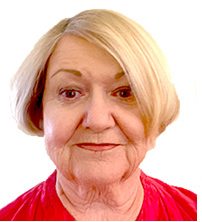Carolyn Corry
 Carolyn Corry
Carolyn Corry
Interview by
Michael Hagerty
July, 2015 Echo
Carolyn Corry worked as Patient Care Volunteer Coordinator at Hospice by the Bay.
She has worked with hundreds of families that used hospice and says that most people wait far too long to learn about the valuable services that hospice offers.
When to Call Hospice
Should I wait until I can’t get out of bed to call hospice?
Absolutely NOT. You should call hospice as early as possible. Medicare, as well as most other insurance policies, cover hospice services, and the services are wonderful—they come to your home. They ask what you and your family need. A nurse can come to your house to adjust medications, make you more comfortable, and order medications and equipment (hospital bed/wheelchair, etc.)
Social workers can connect you with community resources and introduce you to the many hospice services available to you —home health aides to assist with personal care, spiritual services if desired, volunteers to provide caregiver respite and companionship for patients, and assistance with making funeral arrangements. Almost all hospice services, equipment, and medications are covered by your Medicare hospice benefit and therefore cost you nothing.
Most importantly, they help you think about what is important in your life. Do you want to be well enough to walk your daughter down the aisle for her wedding in three months, to be there for your wife’s birthday, to finish that important painting? I never heard a family say, “I wish I’d waited longer to call hospice.” Once they see the relief and comfort hospice brings to patient and family, they wish they’d called earlier!
Should I call hospice as soon as I get diagnosed with cancer?
No—that’s too early. These days, serious illnesses can often be cured or at least managed—even cancer. So when you are first diagnosed with any serious disease, you want to put all your energy on CURATIVE treatments, such as surgery, radiation, and chemotherapy, which have been helping more and more people. But medicine is not perfect, and we all eventually die. There comes a time for all of us when we are exhausted from endless rounds of surgery and chemotherapy, and we want to switch to the PALLIATIVE treatment that hospice provides—excellent pain control and symptom management, enabling you to share precious time with your loved ones.
But if I call hospice, that means I have given up all hope.
You have to CHANGE your hope, not give up hope. The hope for comfort, for counseling and support of your family, and for a meaningful death that will inspire friends and family, all are made easier by hospice. And you can always REVOKE hospice at any time. Many people have called hospice because they were exhausted with painful rounds of surgeries and chemo and they feel the time is right for hospice; however, a month or so later, they might have renewed energy and decide to revoke hospice and go into more curative treatments. You are not eligible for hospice services while undergoing curative treatments. And you don’t even need to decide yet: hospice will visit your home for a complimentary informational visit.
How do I call for hospice service?
First, you need to tell your doctor, “We think we are ready for hospice services”. Your doctor will talk with you and must certify that in his/her judgment, you are unlikely to live for more than six months. If at the end of the six-month period you are still eligible for hospice, you will be recertified. If you are no longer eligible, your doctor can celebrate with you as you are discharged from hospice services.
Remember that almost ALL hospice services are covered by Medicare and other insurance programs, meaning little to no expense to you or your family. If there is a question about eligibility for services for you or a loved one, make the call and request an informational visit.
You can use either of the two hospice services in Marin, Hospice by the Bay (at hospicebythebay.org) or Heartland Hospice (at heartlandhospice.com). ■